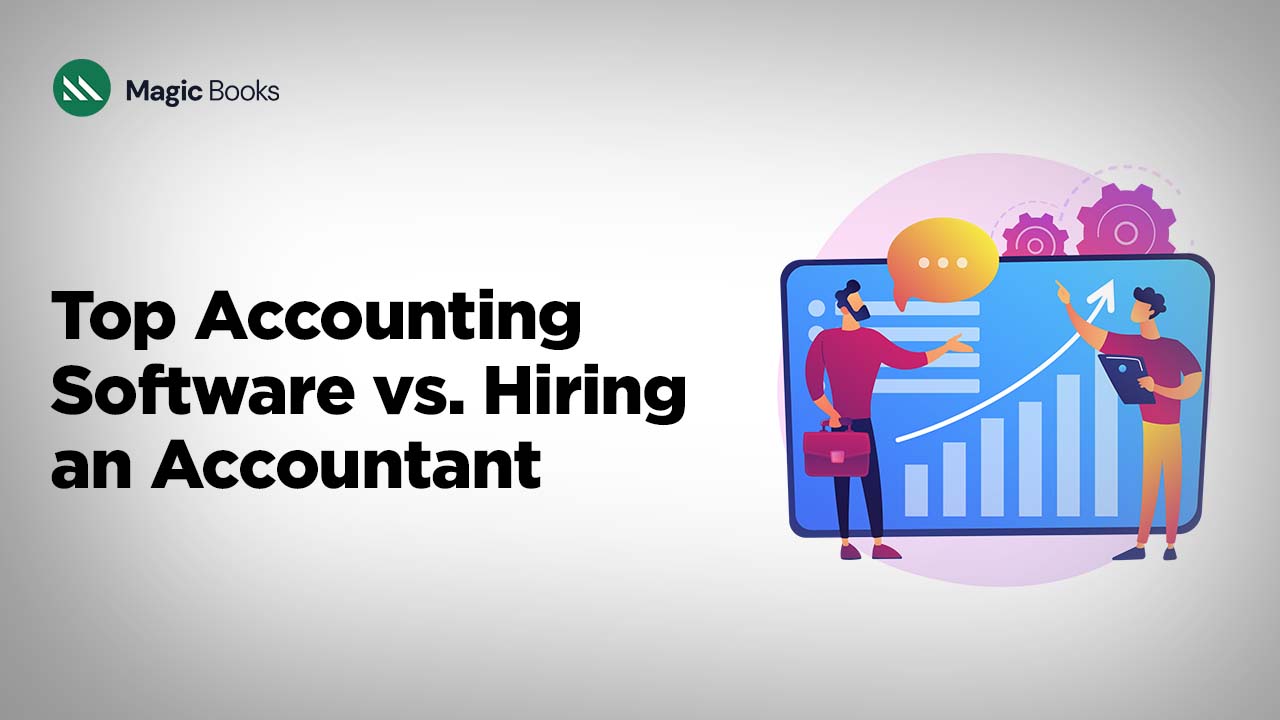Accounting is the backbone of every budding company, providing the framework to track finances, manage cash flow, and make strategic decisions. Accountants can provide their expertise that is beneficial for you as a small business owner, probably pondering whether to use the advantages of modern accounting software or hire an experienced accountant. This two-pronged approach in today’s digital environment catered around the options has changed fortune from one to another. This is a full analysis of the best accounting software and the role of a professional accountant to help you choose the best option to carry out your needs for your business.
Every small business has its own financial hurdles and operational needs. To decide if it wants accounting software or an accountant, it must consider its business complexity, the number of transactions it performs, its growth path, and its other budgetary constraints. A startup with little transaction would consider cost-effective software solutions, while a business on a fast growth path or dealing with a complicated tax situation could do with personalized advice and human oversight. Accounting software provides automation, instant updating, and real-time reports on what matters most to businesses that require up-to-the-minute insight into their financial status. Otherwise, an accountant can offer personalized consultation on tax planning, regulatory compliance, and long-term financial strategy. You will be better equipped to assess whether automation or professional advice most closely aligns with your goals by understanding your business’s needs and priorities.
Overview of Top Accounting Software:
Modern accounting software has completely changed how small business owners manage their money. In the field, the likes of QuickBooks, Xero, FreshBooks, Zoho Books, and Magicbooks have become names one hears daily. Each of these programs provides functions to provide for a variety of business needs. QuickBooks, for example, offers an easy-to-use interface for invoicing, expense tracking, bank reconciliation, and payroll. It is cloud-based, allowing real-time collaboration between business owners and their teams from anywhere in the world. Another favorite, Xero, impresses by being easy to use while having a very user-friendly dashboard and great integration capabilities. It allows one to keep track of accounts payable and receivable as well as detailed financial reporting. FreshBooks provides solutions for freelancers and small service-based businesses with invoicing and time-tracking troubles, while Zoho Books provides an extremely customizable platform with advanced features such as workflow automation and multi-currency support. In addition to those well-established options, Magicbooks has also formed a very capable alternative for small and medium-sized businesses (SMEs) and enterprises. Magicbooks delivers the full extent of accounting and bookkeeping services necessary for organizations transitioning smoothly from financial accounting to tax compliance. Magicbooks sets one on a course of growth and efficiency by easing the way of managing a business and optimizing the processes of finance. It aims to relieve the pressure of manual bookkeeping and ensure that a decision on tax compliance and financial reporting is made with great care. Such software is able to improve accuracy, limit the chances of human error, and not only spare small business owners the labor of dastardly monotonous tasks.
The Role of a Professional Accountant:
Accounting software can be really helpful in routine tasks; on the other hand, employing a professional accountant brings to bear vast knowledge and insights into the subtle aspects of financial management that software can never begin to cope with. While accounting software can put together some sets of financial statements, an accountant can do much more than that; he or she can put strategic inputs into compliance problems that arise from time to time with evolving tax laws, providing strategic advice to business leaders based on trends in the financial workflow. They can find out possible financial troubles with his business and make recommendations for improvement like tax planning, cash flow optimization, and other cost-cutting measures. Additionally, the professional can conduct an audit or a review in accordance with the law, which would be difficult for some types of accounting software. When circumstances require swift and customized decisions in times of crisis or major changes, human judgment and experience with professional matters come in handy.
Software vs. Accountant:
Cost Comparison:
When it comes to choosing accounting software versus hiring an accountant, cost is always one of the first factors to look at. Generally, accounting software is subscription-based with varied pricing packages in which businesses can select a plan to fit their specific needs and budget. There is the QuickBooks package, for example, from basic packages for the single proprietorship to packages more suitable for larger small businesses. Software is relatively cheaper for initial and ongoing costs than hiring a full-time accountant. While the accountant will charge according to experience, the complexity of the business, and the services performed. At first glance, hiring an accountant may appear to cost more, but this is usually made up for with the value they will bring to the table-such as professional advice, customized financial advice, and navigating a thicket of tax laws. In many cases, they may lead you to deductions, reduce liabilities, and generally save you money in the long run through higher efficiencies in financial management.
Automation vs. Manual Processes:
For small-business owners, time is an important resource; thus, the effectiveness of the accounting process directly reflects the time available for focusing on the core activities of the business. Accounting software eliminates repetitive tasks such as data entry, invoicing, and the like, freeing up valuable time that would otherwise be spent on manual calculations and paperwork. This also speeds up the accounting process while reducing human error, resulting in more trustworthy financial data. Software solutions often include dashboards and real-time reporting features, so you can look at a glance to see how your business is doing financially. A hands-on approach is required, however, with the human element involved at every stage when you are hiring an accountant. While this may take longer than the automated software, the insights provided, along with the great understanding based on nuanced knowledge, are immensely valuable for making strategic decisions. Based on the needs of your business operating, you will pay in speed or extra valued service.
Flexibility and Scalability for Small Businesses:
For small business operators who would like to uphold their business expansion without being restrained by monetary management bottlenecks, scalability stands to their necessity. Accounting software provides a scalable solution that builds and maintains itself in line with the business expansion. There is a wide selection of modern software platforms today able to provide flexible features to allow for more user addition, module integration, or even upgrade of services on-demand. Such an allowance for flexibility favors businesses whose transaction volumes are unstable in nature or seasonal variations. More so, cloud-based accounting software guarantees any financial information much instantly available from any point, thus making a business easy to manage with remote teams or in different locations. It is quite a difference, however, as the scalability of hiring an accountant is stamped on the availability of qualified persons plus the cost of implementing amplified services. The insights and personalization from an accountant could indeed be significant, yet such a human resource scaling concerning rapid business growth is bound to prove challenging.
Accuracy and Compliance:
There is to be no compromise when it comes to accuracy in financial reporting: accounting software and qualified accountants play their part in keeping regulatory standards in check. Newer versions of accounting software come equipped with very sophisticated error-checking capabilities, including audit trails built into each and every report, which should help keep an accurate record. With features such as automated bank feed capability, real-time reconciliations, and built-in tax computation, the scope for mistakes is greatly reduced, and your financial data can be kept both reliable and accurate. Software is updated regularly to keep it in line with the constant flow of new tax legislation and new accounting standards, so businesses that are under the pump with their various regional requirements find this particularly useful. While the software can manage routine tasks exceedingly well and catch errors, not every error can be captured, especially those that require a judgment call by a professional. Here again is where an accountant shines: with experience and comprehensive knowledge of financial regulations, they can look through financial statements, catch inconsistencies, and counsel on complicated compliance challenges. They can also prepare for audits and ensure that your business meets every requirement that has been set so that there is no risk of fines or legal difficulties.
Which Option Fits Your Business?
Choosing between top accounting software and hiring an accountant is a huge issue. In weighing the two options, there should be a proper assessment of the current financial needs of the business, any plan for future growth, budget constraints, and the specific level of expertise required to run financial functions effectively. If your business model is rather simple and you want a reliable and simple solution that automates day-to-day functions without breaking the bank, modern accounting software would serve you great. It makes life easier by simplifying cash operations while providing real-time business insight and easy integration into virtually all other business applications. Another hand, if the company deals with certain big financial problems, has to deal with regulations, or its strategic planning and personalized advice from a professional accountant are required additional investments made could pay off quite well in the long run. The final decision would always depend on whether you want to use automation or go hand in hand with human expertise. A lot of small-business owners prefer a mix of these two, which usually implies making use of accounting software on a day-to-day basis and consulting an accountant occasionally over strategic decision-making and compliance checkups.
In other words, most small entities have managed a balanced decision on accounting software and professional accountants by using a mixed approach. For example, a moderately active boutique retail business may call upon Magicbooks for daily bookkeeping and expense tracking but consult an accountant at the end of the fiscal year for tax implications and growth planning. A service-based firm may do the same for invoice and time management; however, strategic financial planning and addressing complex compliance issues would still call for an accountant’s expertise. Such examples suggested, that albeit the accounting software may offer a relativement acceptable déjeuner and cost savings, the knowledge and personalized service offered by the accountant add so much to the financial health of the business in question.
But for a lot of small business owners, the choice needn’t be really one or the other. A hybrid approach leverages both the assets of accounting software and certified professional accountants quite well, in many cases providing the best of both worlds. In other words, good accounting software could be used for daily work and data management, which means efficiency in operation but also the club information to perceive any inaccuracies within the financial statements in real-time. Video consultations with an accountant, every so often, allow for accounting and tax planning advice that is more personalized to fit a client’s needs. You will gain from the efficiency of automation, plus whenever you need it, the expertise of a human. Then, as you grow, this hybrid between accounting supervision and accountant interventions may change, with more tasks being automated and more specialized advice being supplied only for high-impact decisions.
In that sense, choosing the proper option is based on weighing the possibility that, perhaps, automation could give you a lower-quality service as opposed to an individualized one. The current accounting software keeps being updated in order to offer a better service: automatic reconciliations, real-time reports with information on the status of the company, and linkages with other business systems. On the contrary, an accountant gives insights beyond benefit measuring: strategic financial planning, tax optimization, and compliance management. With business changing fast, it is critical to make periodic assessments of the financial arm of the business to determine compatibility with the business goals and adaptability to market fluctuations. In the end, it really comes down to weighing the real needs and long-term aspirations of your business between shelling out for a top-tier accounting package, hiring an accountant, or somehow mixing the two. Take the time to prescribe how you’re going to deal with your operational frustrations, budget constraints, and growth plans into a financial management approach that uses technology as far as possible while also taking advantage of insightful human expertise when appropriate. To summarize, the conclusion is that all small business owners benefit, in one way or another, from affordable business accounting software as well as from hiring an accountant. Software solutions provide cost-effective automation, improved efficiency, and scalable integrations, while professional accountants deliver personalized expertise, strategic planning, and thorough regulatory compliance. Striking a balance between these two options is key to developing an effective financial management plan that fulfills the short-term operational needs and also aligns with long-term business aspirations.



